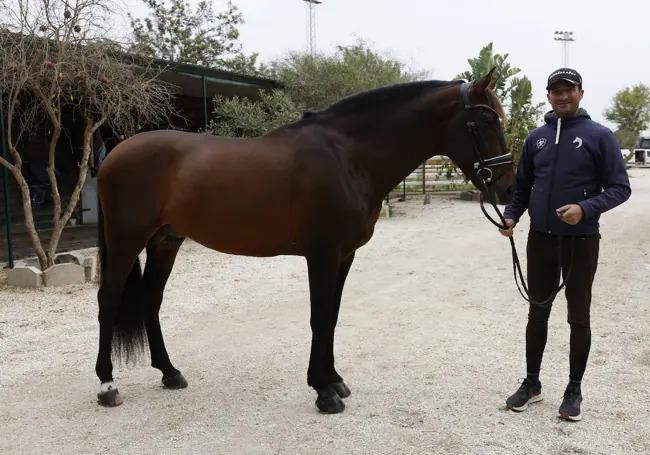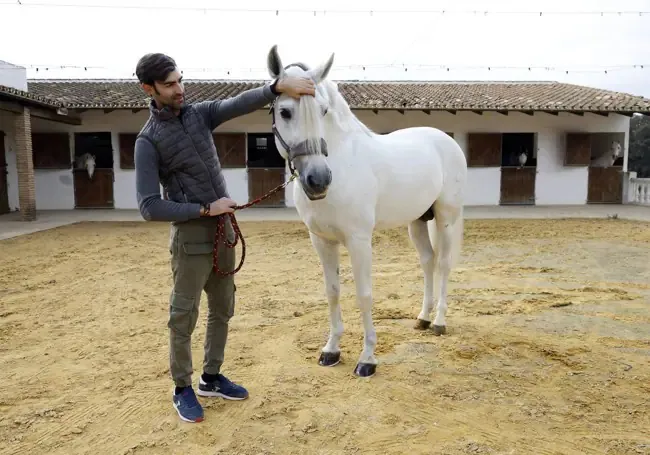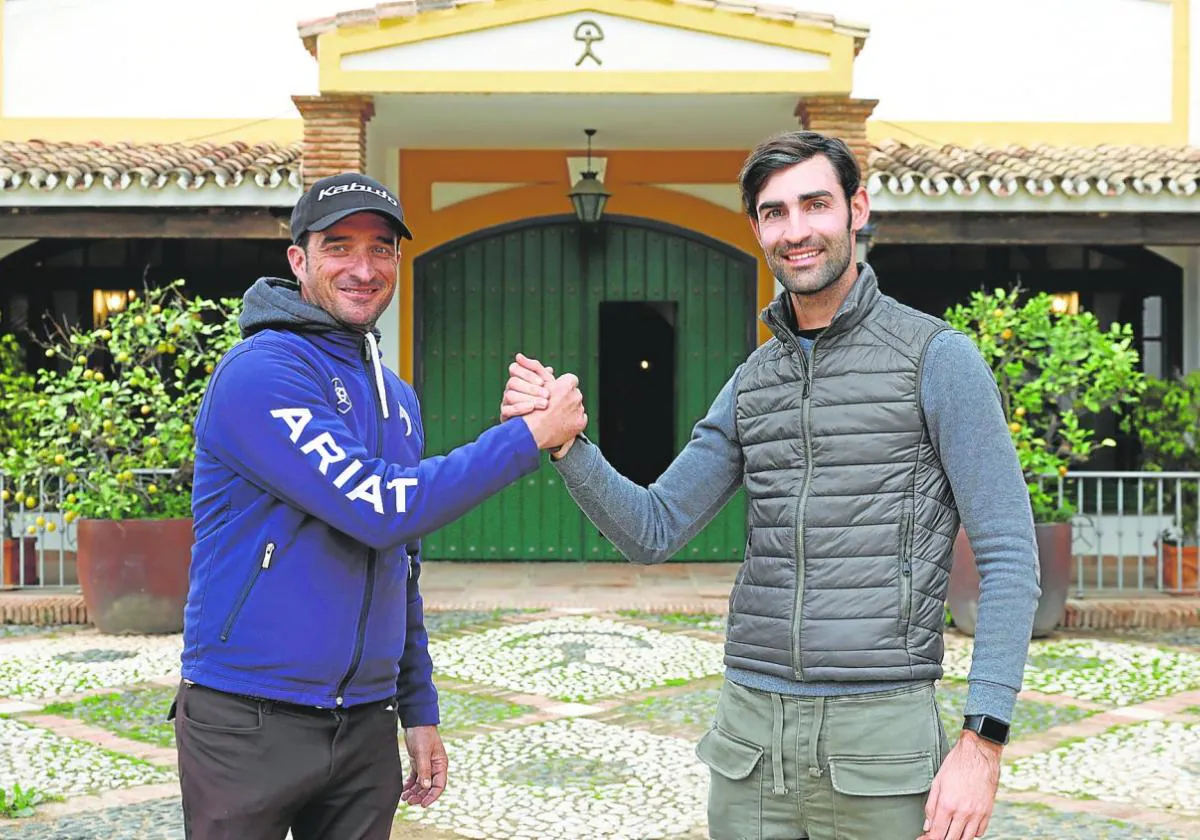'For us, it's all about the horse'
José Daniel Martín Dockx and Alejandro Sánchez del Barco are dressage riders. These two men from Mijas, with a great chance of reaching the Paris Summer Olympics, speak to SUR about their special world and somewhat unfamiliar sport
Pedro Luis Alonso
MALAGA.
Friday, 26 January 2024, 19:57
The meeting takes place at the Los Ortejones finca on the Carretera de Entrerríos road in Mijas. It's a relaxing place. The Indalo stud farm has a whopping 64 horses in the stable, five of which are currently competing. One of them is Quincallo, guided by Alejandro Sánchez del Barco, 29. Not far from there, José Daniel Martín Dockx, 50, has a stable at the Mijas hippodrome where Malagueño LXXXIII shines. Both riders are from Mijas and are hopeful of representing Spain in dressage at the upcoming Paris Olympic Games. SUR brought the pair together to talk about a discipline that is still not very well-known or understood by the general public.
-How did you get into the world of horses?
-José Daniel Martín DockxIn my case, my father was a big horse enthusiast, and there were always horses at home. I belong to a different generation, and when I started, there was no classical dressage. It was all about Western riding. Later on, I started getting into classical dressage, and because I rode during the week or went to ferias or shows at the weekends, my hobby turned into a profession.
-Alejandro Sánchez del Barco:My dad always used to work with my godfather and trainer, Isidro Maldonado. They moved to Fuengirola from Aguadulce, and later, they had an estate, Fuente La Teja, nearby. When I was just a year old, they put me on a horse. I've always had that curiosity, that passion.
-How do you describe your connection with horses? Does it go beyond what you feel for people?
-J. D. M. D.: For me, it's all about the horse. It's not just a tool for work, but something more. With some horses, you develop a really special bond. You live with them for many years, experiencing a mix of positive and negative moments.
-A. S.:It's true, the bond you form with a horse is incomparable to any human connection; it's something unique. When you enter the arena, you aim to showcase the special connection that takes years to build and is quite demanding.

-Is dressage the best discipline to reflect that connection between man and horse?
-J. D. M. D.:Not necessarily. To be competitive at a high level, the specific discipline isn't really important, but it does require dedicating a lot of time to the horse and having a good team behind you. It's true that those of us who love dressage see it as the most comprehensive discipline. In dressage, we aim for quality in the walk, trot and canter (the three gaits), a highly refined technique, and absolute precision in the movements. We strive for perfection.
-There are two decades between you, so I'd like to ask Daniel how he met Alejandro...
-J. D. M. D.: Well, it's been many years. His trainer, Isidro, used to rent a stable from my father. Diego, Alejandro's father, was Isidro's stablehand. You could say I've known him since he was born.
-Have you ever trained Alejandro before?
-J. D. M. D.:No, I haven't. We've crossed paths because I'm the Spanish selector for young purebred Spanish horses (PRE) that go to the world championship. Alejandro has taken part in two or three editions, and I kept track of his performances there, offering my opinion, but not so much on how to train him.
-Alejandro, can you tell us about Malagueño LXXXIII and what Daniel brings to competition?
-A. S.:Daniel is a solid rider, no doubt. I liked him back when he rode Grandioso [his horse in London 2012 and Rio de Janeiro 2016], but I think he's taken it up a notch with his current partner. As a PRE horse, he's top class, especially when we're competing outside Spain. When it comes to competitions, his charisma shines, and he nails the piaffé, those long trots and the gallop.

-Daniel, what are Alejandro and Quincallo like together?
-J. D. M. D.:Alejandro is young, but he's really talented. He understands the horse and can achieve things that other young riders his age might not. Another strong point is the confidence he exudes. I've seen him with the Spanish team for two years in really tough competitions, and he handles himself like someone with more experience. As for Quincallo, I would say he's a very consistent horse. He doesn't lose many points, and with what Alejandro brings to the table, it's a reliable combination. They'll get the job done.
-Let's talk about the Olympics. Both of you were part of the Spanish team at the last European Championship, along with Severo Jurado and Jiménez Cobo. When will we know if you're going to make it? Which competitions could be decisive?
-J. D. M. D.:We hear that the decision will be made in the first week of July after [the World Equestrian Festival in] Aachen. In my case, I think it will be tricky. There's a lot of competition.
-A. S.:Yes. Many factors come into play. When you go to a competition, you're at the mercy of the judges, who may like you one day and less the next. I think, in the end, it's about consistently performing well in competitions and trying to be in top form for major events, such as the Spanish Championship at the Barcelona Polo Club in the first week of June. The top four from there will go on to Aachen.
-Daniel, you're 50 now. Is this your last Olympic cycle?
-J. D. M. D.:I feel good, more mature than before, but the idea of competing at 60 doesn't really appeal to me. I'd rather quit at my peak rather than drag myself around the tracks just for the sake of it. Being in my third Games [he made the cut in London 2012 and Rio 2016, and just missed out on Tokyo 2021] would be a big deal for me. The Games are the best experiences I've had in competition. It's a whole different ball game. It's a beautiful and awe-inspiring thing to live through. Until you're in it, you don't grasp the magnitude of it.
-A. S.:When I started competing at a higher level, I always dreamed of taking my horse to a Grand Prix and training more horses at that level. I'm making progress, but I never really thought about the Olympics in the short term because it's only my third year. But now that the date is getting closer, I feel those little flutters in my stomach because it's the pinnacle for a rider. I don't feel anxious; I'm really excited and eager. If we can make it there, we'll embrace it with everything we've got.
-Can you make a living from horse training?
-J. D. M. D.:I make a living as a professional in this field. You don't get rich, but you earn a salary and can pay your bills. There's a difference between Olympic and non-Olympic years because you receive a grant from the Spanish Equestrian Federation, which comes from the CSD (Higher Sports Council), and it helps you more.
-A. S.:Elsewhere in Europe, it's very different; you're more of a public figure, and people are into it. Spain should embrace it more. The vast majority don't realise how demanding it is, not just for the rider but for their team as well. It's a shame that not many people are aware of this from a media perspective, especially considering the deep roots horse riding has in Spain.
